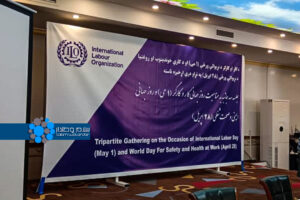KABUL (SW) – Afghanistan needs over 2.27 million metric tons of additional wheat this year to meet domestic needs, said officials.
This is despite the fact that National Bureau of Statistics and Information reportsd the production of 4.35 million metric tons of wheat this year in the country.
Misbahuddin Mustain, the spokesman of the Ministry of Agriculture, Irrigation and Livestock, told Salam Watandar that Afghanistan needs more than six million metric tons of wheat this year, of which only more than four million metric tons have been provided inside the country.
Mr. Mustain added: “In the year 1402, compared to the last two years, wheat yields were high due to the conversion of 300,000 hectares of poppy land into wheat and the increase of monsoon rains. Our total yield was 4.35 million metric tons, but the demand is 6.62 million metric tons. We need 2.27 million metric tons of wheat to be supplemented from outside.”
On the other hand, the officials in the National Statistics and Information Department say that by analyzing the satellite images of the fields under wheat and blue wheat cultivation, this department has found that this year’s wheat yield has increased by 13% compared to last year.
Mohammad Halim Rafe, the spokesman of this department, told Salam Watandar that nine percent of the land under wheat cultivation has increased this year. He added: “The figures obtained show that the areas under wheat cultivation have increased by 4.4% compared to last year in the irrigated sector and by 15% in the dry sector.”
A number of agricultural experts say that Afghanistan, having natural resources and vast lands, needs proper planning in the agricultural sector so that all its needs in the wheat sector can be provided from within the country.
Khadem Hamdam, an agricultural expert, says about this: “This 13 percent increase may provide a portion of the need, but at the general level, it cannot provide food security for the whole country. In order to increase the yield of wheat, it is necessary to survey and research wheat production areas. There is a need to teach agricultural operations, agricultural raw materials, and work methods for farmers.”
Mohammad Masoud Ebrahim, another agricultural expert, said: “Given the current conditions, the drought situation, the lack of water and climate change, increasing wheat yields is not realistic, but for Afghanistan’s self-sufficiency, it is necessary to properly use Afghanistan’s underground water, abundant water and plain lands in wheat production.
ENDS






